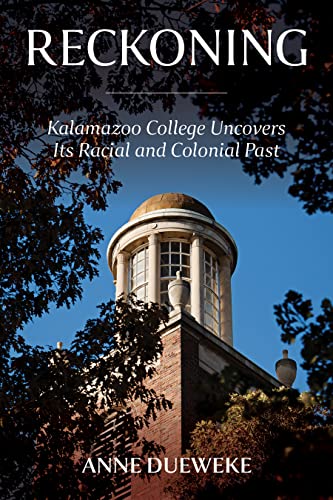
A new volume examining the history of racism and oppression at Kalamazoo College has just been published. Reckoning: Kalamazoo College Uncovers Its Racial and Colonial Past is now available in the Kalamazoo College Library in print and as an e-book. It is also available to purchase at various brick and mortar and online bookstores, including the Kalamazoo College Bookstore.
Anne Dueweke, K ’84, will appear for a book launch reading and reception at the Arcus Center for Social Justice Leadership on April 7, 2022 at 5:30pm. She will also be leading a discussion with Kalamazoo College faculty and staff on May 17, 2022 as part of AntiRacist Reading Knook (ARRK).
From the publisher: At a time when many individuals and institutions are reexamining their histories to better understand their tangled roots of racism and oppression, Reckoning: Kalamazoo College Uncovers Its Racial and Colonial Past tells the story of how American ideas about colonialism and race shaped Kalamazoo College, a progressive liberal arts institution in the Midwest. Beginning with its founding in 1833 during the era of Indian Removal, the book follows the development of the college through the Civil War, the long period of racial entrenchment that followed Reconstruction, minstrel shows performed on campus in the 1950s during the rise of the Civil Rights movement, Black student activism in the wake of Martin Luther King’s assassination, the quest for multiculturalism in the 1990s, and the recent activism of a changing student body. This close look at the colonial and racial history of one institution reveals academia’s investment in White supremacy and the permutations and contradictions of race and racism in higher education. Though the details are unique to Kalamazoo, other predominantly White colleges and universities would have similar historical trajectories, for in the end our institutional histories reflect the history of the United States. By examining the ways in which a progressive, midwestern college has absorbed, resisted, and perpetuated American systems of colonialism and racism, the book challenges higher education to use this moment to make the deep, structural changes necessary to eliminate disparities in experiences and outcomes among students of color and their White peers.
